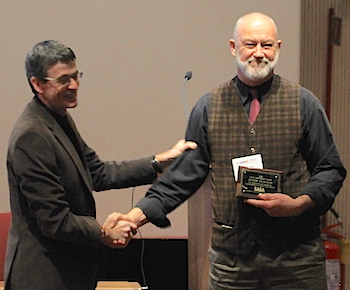News
» Go to news mainDuinker wins major award in environmental assessment field

Peter Croal, IAIA Awards Committee Chair, presents the 2015 Individual Award to Peter Duinker (Photo: IAIA)
This April, Dr. Peter Duinker traveled to a conference in Italy to receive the International Association for Impact Assessment (IAIA) 2015 Individual Award. The prize, IAIA explains, “acknowledges personal contribution to the discipline of impact assessment” and “recognizes major achievement and advancement in theory and/or practice over a period of time at an international level.”
The award, says Duinker, is essentially for lifetime achievement. He has been contributing innovative research to the field of impact assessment for 35 years. “In the summer of 1980, the School for Resource and Environmental Studies launched the largest-ever Canadian investigation into the scientific foundations of impact assessment,” he says. “I was in the right place at the right time.” Duinker and SRES professor Gordon Beanlands published a well-received paper based on the investigation, and Duinker continued researching this field, including for his PhD thesis. Since then, he has published 13 journal papers, five book chapters, 12 reports, and dozens of presentations on environmental impact assessment (EIA). “My publishing in the 1980s was mostly about EIA and my papers since then are well-known papers,” Duinker says. While he focused on other areas during the 1990s, in 2006 he returned to the EIA field, working on papers with an Ontario colleague, Lorne Greig, again to accolades.
So what is impact assessment? There are many types, explains Duinker, including his field, environmental impact assessment, which has existed since the 1970s. “EIA is a process where provincial and national governments give or refuse approval to developments which may have a significant impact on the environment,” he explains. Most of Duinker’s research has studied the scientific foundations of EIA and ways to “assemble high-quality scientific information to enhance decision-making.” His PhD thesis, for example, examines the long-term impact on animal populations of herbicide use, employing data and modeling techniques to predict impact. Duinker describes the need for the kind of studies that he and Beanlands began: “People were frustrated because EIAs looked at too much. They were saying ‘we need focus.’” This need resulted in the concept of Valued Ecosystem Components (VECs), specific areas of impact that vary from project to project. As the IAIA noted, Duinker’s work with VECs “changed the way many practitioners approach environmental and cumulative impact assessment.”
Aside from his research, the IAIA noted that Duinker received the award “for his dedication to improving and promoting impact assessment.” He has been teaching EIA since 1981, and engages in professional practice. “I review impact statements,” he says, “and I have served a few times as a panel expert, helping the government determine if they’ve received a quality environmental impact statement from the developers.”
Duinker joined the IAIA in 1981, the year after it was founded. It is the only global organization for impact assessment professionals, and is open to practitioners as well as scholars. “Among Canadian professors of EIA, there might be 30 to 50 of us, and there are about ten of us who have been hanging around this subject matter for decades,” says Duinker. “I’m now one of the granddaddies of the lot.” Reflecting on the award, Duinker says, “It’s very gratifying. But I’d be gratified even without getting the award, from seeing the citation impact of my important EIA papers. I’ve had high impact in this field, and that’s gratifying.”
Recent News
- Professor M. Ali Ülkü receives 2024 Archibald Award
- Project to address harmful language relating to Indigenous peoples receives prestigious Mellon Award
- Four decades of friendly hellos
- Students speak with passion about recipients of Teaching Excellence Award
- Brothers, and Dal alums, adapt and learn to achieve career success
- Najah Attig and Oumar Sy win prestigious Graham and Dodd Scroll Award
- Curiosity in human behaviour leads Huiyan Liu (MSc’23 ) to a PhD
- In Memoriam – Dr. James R. Barker
